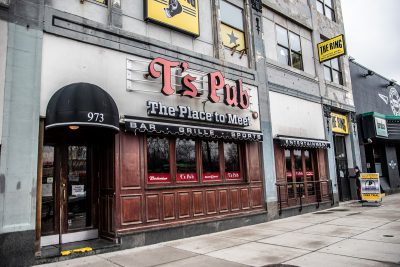Food and retail establishments still packed a month ago now stand empty across the city. Dozens have ceased operation for the coming weeks while others are trying to adapt to limited service.
Home to more than 50 universities, Boston is a city that leans on college consumers. Many in the service industry have taken major hits since schools began closing their campuses last week, sending tens of thousands of students home.

Several small businesses on Commonwealth Avenue have been feeling the effects, and the reverberations continue to compound.
Joe Rastellini has owned T. Anthony’s Pizzeria since 1976. At 71 years old, this is the first time he’s been at a loss for how to proceed with the place.
“Usually when you’re in business for a long time and you feel you’re managing something and you’ve done it for a long time, you feel you have some kind of control,” Rastellini said. “I don’t have that feeling, that sense, at all.”
T. Anthony’s business waned by about 10 percent over the week of Boston University’s Spring Recess, a time simultaneously fraught with intensifying coronavirus concerns. But Rastellini said Gov. Charlie Baker’s new dine-in ban, effective Tuesday until April 6, could ultimately cut business by 70 percent.
“Everything’s upside-down so I don’t even know what’s going to happen in an hour,” Rastellini said. “Every time you wake up in the middle of the night it’s on your mind. What’s coming down the road?”
This unprecedented and “drastic” drop-off rate, Rastellini said, has forced him to begin worrying about whether he will be able to keep doors open. With a staff of nearly 20 employees, he is now considering laying workers off.
Rastellini wants to do the right thing, he said, but no longer knows what that entails.
“Some people can stay home and work from home, but other people, this is my livelihood and I have a big responsibility to try to make this place work so I have to come to work no matter what,” Rastellini said. “So there’s a certain percentage of people that have to come to work and be exposed and I’m in that category. And I’m not young.”
Nud Pob Thai Cuisine manager Wanna Watt said her restaurant also noticed diminished business beginning last week, more so than the typical Spring Recess lull.
“It’s very bad. It’s never happened like this before,” Watt said. “Compared with summertime when the students are not here, this is worse, I think.”
While the restaurant is feeling the financial strain, Watt said she will likely not be laying off any employees. Instead, everyone will have to cut down on work hours.
“Normally the people who work here, for example, in the kitchen, we work five people the whole week, every day,” Watt said. “Now, each person works only three days a week, something like that.”
When the situation calms down in Boston, Watt said she expects business to return to normal swiftly.
“We are a local restaurant for all the students and all the workers from BU around here. They know us,” Watt said. “For now, it’s ridiculous, but no one wants to be like this. So we understand, and we hope it will get better soon.”
Also seeing an especially severe dip in business this past week was T’s Pub Boston, according to manager Dan Quintino. The bar entered a temporary closure Tuesday.
“I think the tip employees are the ones that are going to be hurt the most. And a lot of people that work as servers and bartenders, they use this as their only way to make money,” Quintino said. “We have a bunch of people that rely on this as their only job.”
Reliant heavily on college students and karaoke night attendees, T’s Pub used to attract an ample flow of customers, especially during lunch hour and after events at Agganis Arena or Paradise Rock Club.
Quintino said he hopes all former employees will return to work once the venue reopens, although he expects he’ll need to rehire.
“Because I’m assuming that once this whole thing is over, and the cabin fever that’s set in when everybody is not able to go out, I think it’s going to be booming here for probably a month or so,” Quintino said. “So we’re going to have to stock up and stock up on employees quickly. It won’t be easy.”
But restaurants and bars are not the only local businesses suffering. Boston City Florist has lost 80 percent of its business, according to manager Nick Sabokrooh.
“All our functions are gone from BU. All our events are canceled,” Sabokrooh said. “It’s a disaster. It’s devastating for the store.”
Employees are working less, Sabokrooh said, because there’s “nothing” for them to do. While he hasn’t made any layoffs yet, Sabokrooh said he might soon have to in addition to buying less inventory for the store.
“I don’t know how we’re going to adjust to all of this. I honestly don’t know. It’s such an uncharted territory,” Sabokrooh said. “It’s so unfortunate that we all have to go through this and it’s nobody’s fault. You don’t know who to blame.”
Many off-campus restaurants and bars in Boston are faring no better.
After 22 years of running Bukowski Tavern in Back Bay, owner Suzi Samowski found herself laying off her staff and filing for unemployment herself this week.
Samowski told her workers Monday to go on unemployment, as she knew the Tavern could not afford to support them going forward.
“I got the last payroll in and scrounged up enough money to make sure everyone got paid,” Samowski said. “But I can’t pay my rent. I’ve called my landlord for leniency. We’re looking for a loan. We have a lot of bills to pay, and we can’t pay them.”
Fears of coronavirus had been gradually dwindling the number of residents willing to venture out for food or drink. Over the past three weeks, Samowski said, business in her restaurant had dropped by about half.
Then, all eateries in the state lost their remaining dine-in customers Tuesday in accordance with Baker’s announcement. But Samowski determined that the Tavern would not survive this way.
“We opened Monday all day and there was hardly anybody, so we made the decision to close completely,” Samowski said. “Because we can’t afford to pay our employees to stay open for takeout when there’s no one around. It doesn’t make sense.”
Before the closure, apprehensions about potentially catching the virus disquieted staff members — and extensive cleaning didn’t help much. Employees didn’t feel completely safe working, Samowski said, but they continued to show up.
“We’re a smaller restaurant so we care about our regular customers,” Samowski said. “I stayed open till the end for them, for the employees, especially my kitchen guys. They all wanted to work till the end.”
Though they’ve become unemployed for the present, Samowski said the Tavern will rehire every worker upon reopening. Meanwhile, she’s had to take care of the food that will go unsold.
“We froze what we could freeze,” Samowski said. “We had to throw out everything else because we don’t even know when we’re going to reopen but we know it’s over two weeks, so we have to throw away anything that was already pre-prepped.”
Once the Tavern heads back into business, it will open first with a limited menu. While Samowski said the adjustment might be rough, loyal locals have also expressed a willingness to step up their support.
“If we can’t order more food right away, we have some food and we’ll just sell what we have just to scrape by,” Samowski said. “And we have a lot of really good regular customers who are going to come in right away and spend a lot of money. They were already telling us that.”


